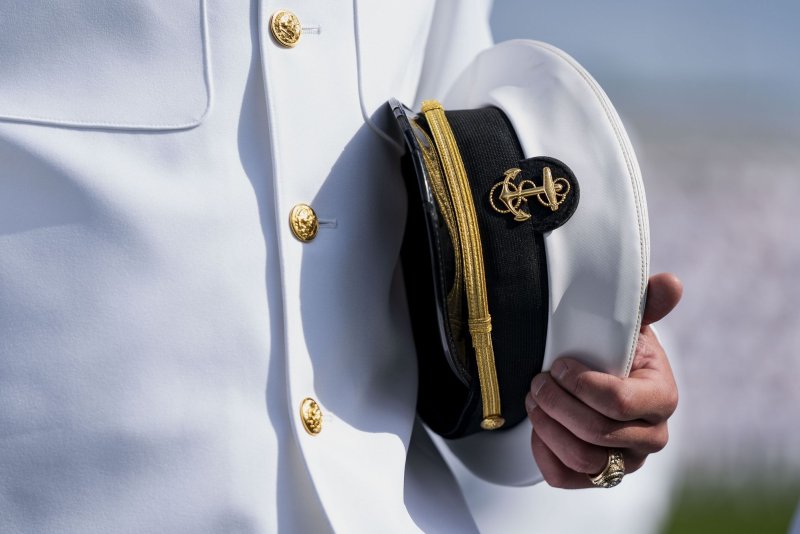A graduating midshipmen carries his hat while participating in the Naval Academy Graduation and Commissioning Ceremony at the U.S. Naval Academy in Annapolis, Md., on May 24. A federal judge on Friday upheld the legality of the academy’s race-conscious admissions program. File Photo by Bonnie Cash/UPI |
License PhotoDec. 6 (UPI) — A federal judge on Friday upheld the legality of the U.S. Naval Academy’s race-conscious admissions program, agreeing it is in the U.S. national security interest to have a racially diverse military officer corps.
U.S. Senior District Judge Richard Bennett sided with the academy’s arguments that its narrowly crafted admissions program, which uses a prospective midshipman’s race as one of the determining factors, passes legal muster under a Supreme Court decision from last year banning affirmative action in higher education.
In his 179-page decision, he noted that in its Students for Fair Admissions v. Harvard ruling from last year, the high court carved out an exception for the nation’s military academies.
“Over many years, military and civilian leaders have determined that a racially diverse officer corps is a national security interest,” Bennett wrote, adding, “The program survives strict scrutiny because the Naval Academy has established a compelling national security interest in a diverse officer corps in the Navy and Marine Corps.
“Specifically, the academy has tied its use of race to the realization of an officer corps that represents the country it protects and the people it leads.”
Students for Fair Admissions, a legal group founded by conservative activist Edward Blum, had sought to extend the reach of the Harvard decision to the nation’s military academies in its current case. The ruling overturned a decades-old precedent by barring colleges nationwide from considering race in admissions, but in his opinion Chief Justice John Roberts exempted the country’s service academies.
Blum said Friday he was “disappointed” by Bennett’s ruling and will appeal the case to the 4th U.S. Circuit Court of Appeals.
“If we are unsuccessful there, then we will appeal to the U.S. Supreme Court,” he said in a statement issued to media outlets. “It is our hope that the U.S. military academies ultimately will be compelled to follow the Supreme Court’s prohibition of race in college admissions.”
The Legal Defense Fund, which filed an amicus brief supporting the Naval Academy in the suit along with the American Civil Liberties Union, hailed the decision.
“We are pleased to see the district court affirm the right of the Naval Academy to use an admissions policy designed to identify talented, hard-working students that hail from all parts of the racially diverse country our military serves,” LDF Senior Counsel Michaele Turnage Young said in a statement.
“The military is keenly aware that a climate of distrust caused by a lack of equal opportunity along racial lines risks mission failure and loss of life. It is unfortunate that some are willing to undermine the safety of our sailors and risk our country’s national security by promoting exclusion,” Young said.
